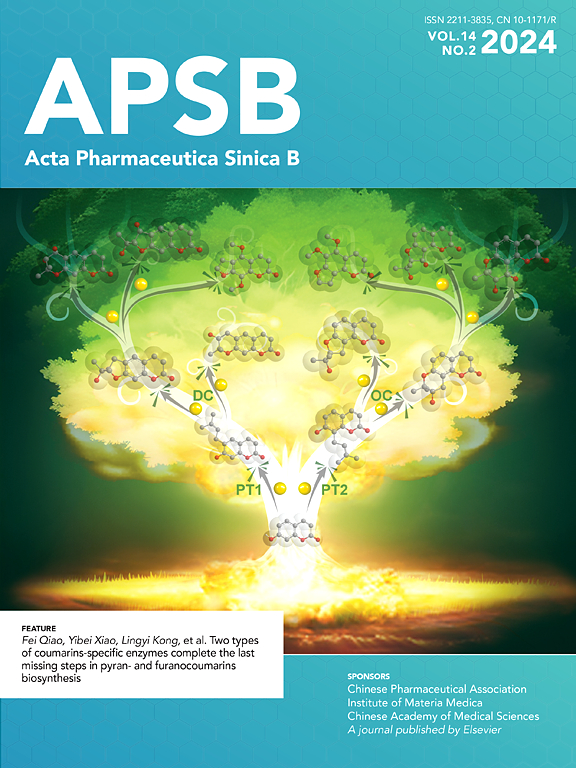吲哚胺-2,3-双加氧酶:维持间充质干细胞介导的免疫调节稳态的重要控制者
IF 14.7
1区 医学
Q1 PHARMACOLOGY & PHARMACY
引用次数: 0
摘要
间充质干细胞(MSCs)由于其强大的免疫调节特性而被广泛应用于各种自身免疫和炎症相关疾病的治疗。多项研究表明,msc介导的免疫调节是复杂的、双向的,体内微环境会影响这种调节的方向。吲哚胺-2,3-双加氧酶(IDO)是一种免疫抑制因子,已被确定为MSCs免疫调节作用的关键“开关”。在这篇综述中,我们探讨了IDO如何作为间充质干细胞免疫调节可塑性的关键调节剂。我们深入探讨IDO表达变化影响各种免疫细胞功能的机制,总结IDO表达在MSC治疗各种疾病中的相关研究和临床进展,并讨论针对IDO增强MSC治疗效果稳定性的潜在治疗策略。这为优化MSCs作为更安全、更有效的临床治疗剂提供了理论基础。本文章由计算机程序翻译,如有差异,请以英文原文为准。

Indoleamine-2,3-dioxygenase: An important controller in maintaining mesenchymal stem cell-mediated immunomodulatory homeostasis
Mesenchymal stem cells (MSCs) have been widely used in the treatment of various autoimmune and inflammation-related diseases due to their potent immunomodulatory properties. Several studies have demonstrated that MSC-mediated immunomodulation is complex and bidirectional, with the in vivo microenvironment influencing the direction of this modulation. Indoleamine-2,3-dioxygenase (IDO), an immunosuppressive factor, has been identified as a key “switch” in the immunomodulatory role of MSCs. In this review, we explore how IDO functions as a critical regulator of MSC immunoregulatory plasticity. We delve into the mechanisms by which changes in IDO expression affect the function of various immune cells, summarize relevant research and clinical advances regarding the role of IDO expression in MSC-based therapies for various diseases, and discuss potential therapeutic strategies that target IDO to enhance the stability of MSC therapeutic effects. This provides a theoretical foundation for optimizing MSCs as safer and more effective clinical therapeutic agents.
求助全文
通过发布文献求助,成功后即可免费获取论文全文。
去求助
来源期刊

Acta Pharmaceutica Sinica. B
Pharmacology, Toxicology and Pharmaceutics-General Pharmacology, Toxicology and Pharmaceutics
CiteScore
22.40
自引率
5.50%
发文量
1051
审稿时长
19 weeks
期刊介绍:
The Journal of the Institute of Materia Medica, Chinese Academy of Medical Sciences, and the Chinese Pharmaceutical Association oversees the peer review process for Acta Pharmaceutica Sinica. B (APSB).
Published monthly in English, APSB is dedicated to disseminating significant original research articles, rapid communications, and high-quality reviews that highlight recent advances across various pharmaceutical sciences domains. These encompass pharmacology, pharmaceutics, medicinal chemistry, natural products, pharmacognosy, pharmaceutical analysis, and pharmacokinetics.
A part of the Acta Pharmaceutica Sinica series, established in 1953 and indexed in prominent databases like Chemical Abstracts, Index Medicus, SciFinder Scholar, Biological Abstracts, International Pharmaceutical Abstracts, Cambridge Scientific Abstracts, and Current Bibliography on Science and Technology, APSB is sponsored by the Institute of Materia Medica, Chinese Academy of Medical Sciences, and the Chinese Pharmaceutical Association. Its production and hosting are facilitated by Elsevier B.V. This collaborative effort ensures APSB's commitment to delivering valuable contributions to the pharmaceutical sciences community.
 求助内容:
求助内容: 应助结果提醒方式:
应助结果提醒方式:


